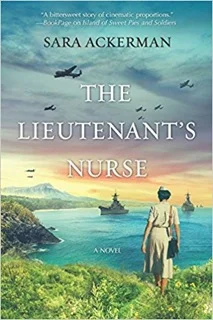Excerpt: The Lieutenant's Nurse by Sara Ackerman
/November, 1941. She’s never even seen the ocean before, but Eva Cassidy has her reasons for making the crossing to Hawaii, and they run a lot deeper than escaping a harsh Michigan winter. Newly enlisted as an Army Corps nurse, Eva is stunned by the splendor she experiences aboard the steamship SS Lurline; even more so by Lt. Clark Spencer, a man she is drawn to but who clearly has secrets of his own. But Eva’s past—and the future she’s trying to create—means that she’s not free to follow her heart. Clark is a navy intelligence officer, and he warns her that the United States won’t be able to hold off joining the war for long, but nothing can prepare them for the surprise attack that will change the world they know.
In the wake of the bombing of Pearl Harbor, Eva and her fellow nurses band together for the immense duty of keeping the American wounded alive. And the danger that finds Eva threatens everything she holds dear. Amid the chaos and heartbreak, Eva will have to decide whom to trust and how far she will go to protect those she loves.
Set in the vibrant tropical surroundings of the Pacific, The Lieutenant’s Nurse is an evocative, emotional WWII story of love, friendship and the resilient spirit of the heroic nurses of Pearl Harbor.
Excerpt
MOSCOW MULES
On the way out the door, it felt as though Eva was walking downhill, then by the time she passed the ballroom, uphill. If only she could go out on deck and watch the horizon to help gain her bearings. Sleeping in these conditions would be a challenge. Sleep in general was a challenge. And then there was Jo and her wretched state. Perhaps Eva should find some soda to bring back to their cabin. Instead of passing by the bar, she stepped inside.
The dark paneled room was empty but for two men tucked away in a leathery booth. A wall full of bottles looked like an accident waiting to happen. On closer inspection, she saw a small wire strapping them in place. She approached and sat down, hoping the bartender would appear soon. Sitting at a fancy bar by herself was not her usual custom and she felt very out of her league. She waited a few more minutes and was about to leave when the bartender returned with a crate full of limes.
He set a floral coaster on the polished wood in front of her. “What can I get you, ma’am?”
She was about to ask for a can of soda water when someone interrupted. “How about a Moscow mule, and one for me, too,” a deep voice next to her said.
Eva nearly choked when she saw who it was and gave thanks for the dim lighting, or Lieutenant Spencer might have seen the blush spreading across her cheeks.
“A Moscow mule?” she said. Where did people come up with these names?
“Something to settle the stomach, with a little kick.” He grinned like he knew a secret and if she were lucky, he just might share it with her.
“Mind if I join you?” he asked somewhat tentatively.
Under normal circumstances, having a drink alone with a naval officer might be seen as improper, but these were not normal circumstances. Life had been flipped on its side, and she no longer knew where home was. Still, she almost declined. But his smile was so earnest and real, with a one-sided dimple that she couldn’t refuse. Plus, the bartender was already pouring and mixing.
“I get the feeling you won’t take no for an answer,” she said.
He laughed. When sitting down, he put enough space between them that another person might have been able to squeeze in. She suddenly noticed he wore a wedding band, and yet something about him had given her the impression he wasn’t married. Maybe it was how she had caught him watching her throughout dinner, or the swagger in his walk that said, Hey, look at me. But it worked out perfectly that he was married; that way things wouldn’t get awkward between them.
Why was she even paying attention to these details? Habit, she told herself. Being twenty-four and unwed sometimes made her feel like an old crone, and she was a keen observer of other folks around her and their status. Billy wanted to marry; he had made that much clear. But with the recent turn of events and her sudden enlistment in the army, marriage was the farthest thing from her mind. Nor were army nurses allowed to marry. So that solved that for the time being.
“So why were you back in America, Lieutenant?” she said.
“Call me Clark, ma’am.”
Despite his easy smile, he was fiddling with his napkin.
“If you don’t call me ma’am, I won’t call you lieutenant, how’s that?”
He nodded. “Deal. Eva. And I was on a brief work trip. Nothing too exciting.”
“Eva” came out with a light Southern twang.
“Where are you originally from, Clark?” she asked.
“How about you tell me? Can’t you guess from my accent?”
She felt like she was being tested. “Give me a few minutes, then, and I will.”
He reminded Eva of her father, who was always requiring her to answer her own questions and solve her own problems. Questions can more often than not be answered by the mind asking them, he liked to say. In his opinion, much of the world’s failures were due to people not paying attention and to simple lack of imagination.
The bartender set down two copper mugs with lime slices on the sides. The pungent smell of ginger wafted up. It made perfect sense to use it for seasickness. Anytime she and her father visited patients with stomach ailments, ginger ale and soda crackers were their initial treatment.
Clark raised his mug. “To fair winds and following seas…and new acquaintances.”
“To all that, cheers,” she said, clinking her mug with his.
She watched him take a gulp, his eyes widening. “Phew, our buddy here at the bar has a heavy hand.”
The first sip burned her nostrils and she tried to remain ladylike while her whole mouth puckered. “What is this? It tastes like firewater.”
“Vodka, ginger brew and lime.”
He held his i in lime. Not thick enough for Georgia or Mississippi. Maybe the Carolinas. She wanted to get him talking to be sure.
“So again, how did you learn to speak Japanese?” she asked.
“I spent some years in Tokyo.”
“Well, that’s different. Was this through the navy?”
“Yes, ma’am.”
She held her nose and took another sip, ignoring his continued use of ma’am.
“They sent a handful of us boys over to learn Japanese. They figured it couldn’t hurt to be able to communicate. Whether they are our friends or enemies, we need people who know the language. My boss was one of the first there. He has a story about a bunch of Japanese seamen visiting San Francisco, and he and a few guys had the honor of showing them around. It turned out they spoke perfect English, and some of them French, too. But none of the Americans knew a lick of Japanese. A few years down the line, he and another guy were sent off. We went later.”
We.
“What was it like?” she said.
“Hot as the devil in the summer, I’ll tell you that. And Tokyo is crowded. But the mountains are about as beautiful as can be. I stayed in a place called Karuizawa, which is an active volcano. The hills are green and rolling, with waterfalls and views of snowy peaks. I fell in love with it, actually. The people, too. At least some of them.”
“I’ve never met one,” she said, feeling the alcohol go straight to her head.
“One what?”
“A Japanese person.”
A wide grin spread across his face and he chuckled. “Like I said earlier, the ones I knew were hardworking and orderly and efficient and generous. Once you had their trust, they’d give you the shirt off their own backs. For them, honor was everything.”
“How long did it take you to learn?”
“We were lucky. We had the best teacher over there. He didn’t waste time with textbooks, but took us to see American silent films with an interpreter telling us what was going on. He was a genius and within a few months we were conversing. It took a lot longer to learn to read and write. But that was all we did there. Learn.”
It all sounded so exotic and daring. And he brushed it off as though it was nothing, but she had a hunch that learning Japanese was not as easy as it sounded. Having to learn a whole new set of characters that looked like hieroglyphics. That would be something else.
She turned toward him. “Say something in Japanese to me.”
He stared into his glass as though he might not have heard, then said, “Eva-san ga kokoni itekurete ureshiiyo. Motto isshoni sugoshitaina.”
His voice sounded like it came from deeper in his chest, spouting out pure gibberish. But his look and tone said otherwise. Like he had spoken a sermon, or given a vow. Whatever it was, she was impressed.
“What does that mean?”
“What did it sound like it meant?”
There he went again, challenging her. “Determining a regional accent is a far easier job than understanding Japanese. I have no idea whatsoever.”
“Most of communication is nonverbal. Did you know that?” he said.
He had a way of looking directly into her, as though he was trying to get to the bottom of who Eva was. It was disarming. And appealing.
“I have no idea what you said, but you did sound serious. Perhaps you were telling me some top secret piece of information? Something you shouldn’t be sharing,” she said.
His eye twinkled. “Very perceptive, Miss Cassidy.”
An emphasis on the miss. She had better bring up Billy.
“So, tell me,” she said.
“I was just commenting on what a beautiful day it was, and our good fortune at sailing on this ship.”
She laughed, unconvinced. “The day was horrid!”
“Storms are beautiful in their own way, don’t you think?”
He had a point. But this particular storm had very bad timing. “They can be. But I am not going to Hawaii for storms.”
“What are you going for?” he said.
As far as the army was concerned, she was simply a nurse looking to serve her country, not a woman running from her own life. “My orders are for Tripler Hospital at Pearl Harbor, so I’m going there to work, but of course I hear it’s the loveliest place on earth.”
“I overheard you saying you’re a nurse.”
“I am.”
“What kind of nursing do you do?” he said.
An odd question, since most people just left it at nurse. “Well, a little of this, and a bit of that.”
“Sounds mysterious.”
“I’ve done everything from wiping a baby’s bottom to helping amputate a leg,” she said.
He squinted at her. “They let a woman do that?”
Her body went rigid. “You don’t think it’s something women can handle?”
“I don’t recall actually saying that.”
“No, but the implication was there. I could hear it in your tone,” she said.
He tapped his glass to hers. “You’re observant, aren’t you? And I admit, there may be that assumption, but mainly because it’s all I’ve known, not because I think it’s beyond the scope of a woman’s capabilities.”
By now the effects of the Moscow mule had taken hold, causing an uptick in boldness. “I would like to go on record as saying we are better at handling it.”
“And why is that?”
“Because women are natural nurturers. At least most of us are. We know how to put the patient at ease, willing to hold a hand or whisper comforting words. It helps them heal. And that is a step most men are woefully unprepared for. Especially in a tough case.”
Her father had seen this in her from an early age, and this was partly why he began dragging her with him for visits whenever she wasn’t in school. And sometimes even when she was, he would show up on the steps of the schoolhouse, which was a stone’s throw away from their cabin. She knew the particular knock of his boots against the wooden planks. I need to borrow Evelyn again, he would say.
Clark looked amused. “I won’t argue with that. Boys out there on the battlefield all shot up, some of them are just crying for their mothers.”
All Quiet on the Western Front had been ingrained in her mind as a teenage girl. Blood-soaked uniforms, missing limbs, watching friends die. The bitter agony. “It’s not something I hope to ever see.”
“You and me both,” he said.
He went quiet for a minute, swirling his mug around and staring at the bottles on the wall. Such a handsome and engaging man. His wife was a fortunate woman. Eva noticed the square angles of his face, and how the dark stubble on his jaw almost seemed to be painted on. She got the strange urge to reach out and touch it, and felt her cheeks heat up.
“I’m going to guess South Carolina,” she said, shaking off the thought.
He raised an eyebrow. “Getting warm.”
“North?”
“Bingo.”
The bartender came by. “Care for another cocktail?”
She realized then that she would be willing to sit there half the night and keep on talking, or even more so, listening. To learn more about world affairs and Hawaii and subjects like nonverbal communication. He knew so much. But she didn’t want to give the wrong impression. Not only that, but one more drink would do her in.
“That’s it for me. I’m feeling the effects of the day,” she said.
Clark escorted her toward the staircase leading down to their rooms. Walking side by side, the top of her head barely reached his chin. The ship still swayed, and every so often, she had to reach out for the wall to keep her balance.
“It’s been a pleasure,” he said, when it finally came time to part.
That same fluttery feeling overcame her again. “Thank you for the company, Lieutenant.”
“Will I see you again?” he asked, looking far more serious than he ought to.
“This ship is big, but not that big. I think you will.”
As much as she wanted to see more of him, she got the sense that spending time with Lieutenant Clark would be a risky endeavor, married or not. One she might not walk away from unscathed.
“Oyasuminasai, Kanojyo,” he said.
“Excuse me?”
“Good night, Eva.”
Grab your copy on Amazon | Barnes and Noble
About the Author
Sara is the bestselling author of Island of Sweet Pies and Soldiers. Born and raised in Hawaii, she studied journalism and earned graduate degrees in psychology and Chinese medicine. She blames Hawaii for her addiction to writing, and sees no end to its untapped stories. When she’s not writing or teaching, you’ll find her in the mountains or in the ocean. She currently lives on the Big Island with her boyfriend and a houseful of bossy animals. Find out more about Sara and her books at www.ackermanbooks.com.

















